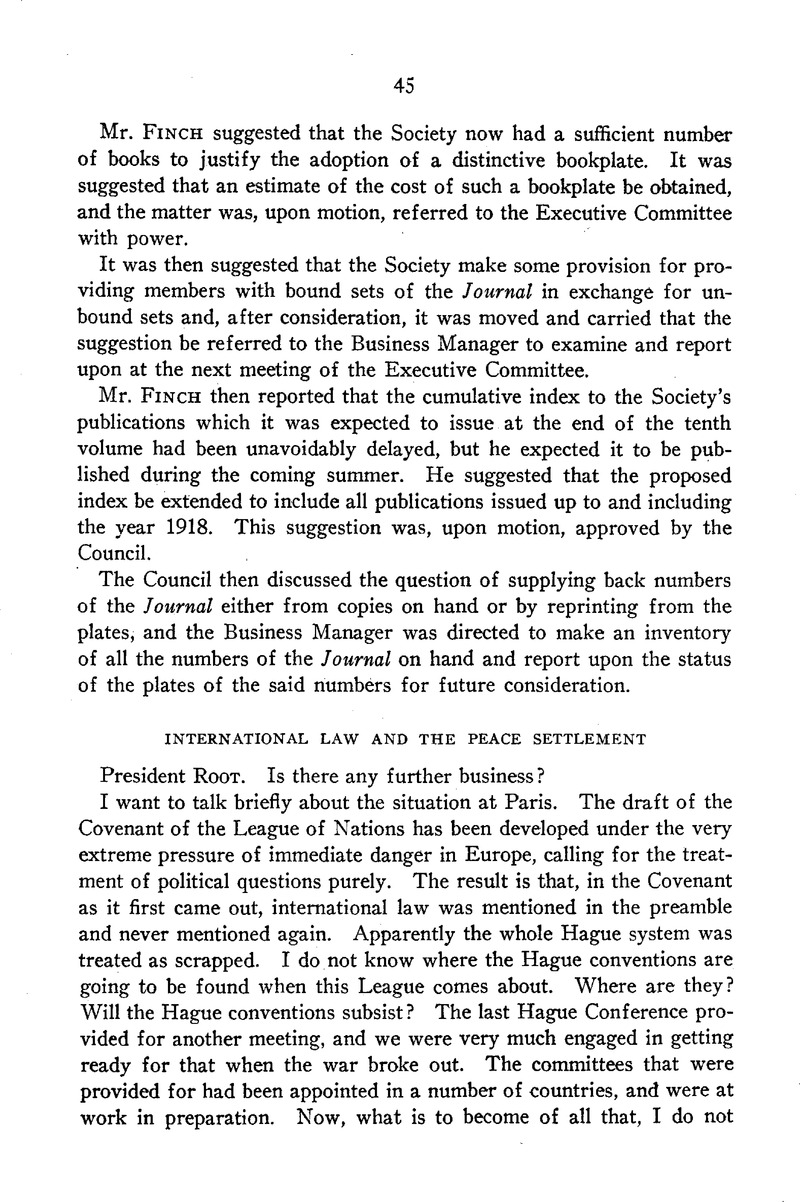No CrossRef data available.
Published online by Cambridge University Press: 27 February 2017

1 The six amendments referred to by Mr. Root were laid before the Council. They read as follows:
First Amendment.
Strike out Article XIII and insert the following:—
The high contracting powers agree to refer to the existing Permanent Court of Arbitration at The Hague, or to the Court of Arbitral Justice proposed at the Second Hague Conference when established, or to some other Arbitral Tribunal, all disputes between them (including those affecting honor and vital interests) which are of a justiciable character, and which the powers concerned have failed to settle by diplomatic methods. The powers so referring to arbitration agree to accept and give effect to the award of the Tribunal.
Disputes of a justiciable character are defined as disputes as to the interpretation of a treaty, as to any question of international law, as to the existence of any fact which if established would constitute a breach of any international obligation, or as to the nature and extent of the reparation to be made for any such breach.
Any question which may arise as to whether a dispute is of a justiciable character is to be referred for decision to the Court of Arbitral Justice when constituted, or, until it is constituted, to the existing Permanent Court of Arbitration at The Hague.
Second Amendment
Add to Article XIV the following paragraph:—
“The Executive Council shall call a general conference of the Powers to meet not less than two years or more than five years after the signing of this convention for the purpose of reviewing the condition of international law, and of agreeing upon and stating in authoritative form the principles and rules thereof.
“Thereafter regular conferences for that purpose shall be called and held at stated times.”
Third Amendment.
Immediately before the signature of the American Delegates, insert the following reservation:—
“Inasmuch as in becoming a member of the League the United States of America is moved by no interest or wish to intrude upon or interfere with the political policy or internal administration of any foreign state, and by no existing or anticipated dangers in the affairs of the American continents, but accedes to the wish of the European states that it shall join in its power to theirs for the preservation of general peace, the representatives of the United States of America sign this convention with the understanding that nothing therein contained shall be construed to imply a relinquishment by the United States of America of its traditional attitude towards purely American questions, or to require the submission of its policy regarding such questions (including therein the admission of immigrants) to the revision or recommendation of other Powers.”
Fourth Amendment
Add to Article X the following:—
“After the expiration of five years from the signing of this convention any party may terminate its obligation under this Article by giving one year’s notice in writing to the Secretary General of the League.”
Fifth Amendment
Add to Article IX the following:—
“Such Commission shall have full power of inspection and verification personally and by authorized agents as to all armament, equipment, munitions, and industries referred to in Article VIII.”
Sixth Amendment.
Add to Article XXIV the following:—
“The Executive Council shall call a general conference of members of the League to meet not less than five or more than ten years after the signing of this convention for the revision thereof, and at that time, or at any time thereafter upon one year’s notice, any member may withdraw from the League.”